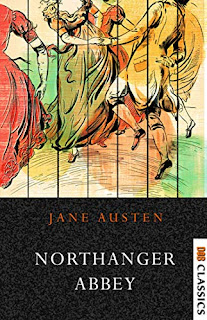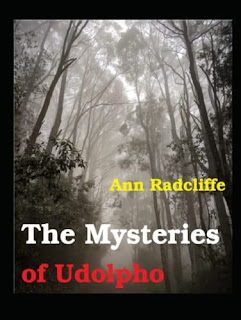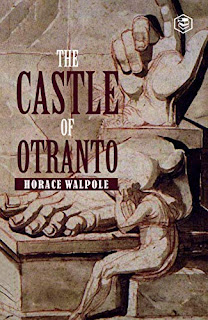Northanger Abbey
Published: December 1817
Author: Jane Austen
Genres: Classic, Drama, Fiction, Historical, Literature, Regency, Romance, Victorian
Check the summary of this book here:
The Review:
The values required for marriage, the importance of fiction in a well-made life, the narrative's consistency despite the shift in a scene from Bath to the Abbey, and much more can all be found in Jane Austen's Northanger Abbey. On these and other themes, many volumes of commentary have already been published. I just realized that Austen is such a superb artist that the reader of Northanger Abbey misses the intricate framework that underpins the story.
I think it's just as wonderful, if not slightly better, than Jane Austen's other novel, Emma. I almost laughed out loud numerous times while reading this book. The dialogue and internal monologue are both hilarious. I really liked the tension between the protagonist and some of the Bath buddies she meets. Not everyone is good, and I enjoy having mixed and flawed characters in a story while reading. There's also a mystery that begins around halfway through the book and is entertaining to read about. The narrative is a touch sluggish and heavily focused on the characters, but that is true of any Austen work.
The title of this work, Northanger Abbey, is actually the address of a character in this novel who adores reading gothic romances. Even if I am not a fan of this genre, I can read these novels without growing bored since I feel that each form of writing may teach me something new. It is a must if you are a student learning English. I'm curious how many current novels will still be in print in over a century.
It is her first work, although it was released after all of her other novels had been published due to a publisher who had already paid her but never published this novel and had to be sued. That is why this novel is apart from her other works.
And that is why for many readers, including Jane Austen devotees, Northanger Abbey appears to be a sloppy attempt to emulate Jane Austen's writing style at times. The book develops the funny eccentric characters that Austen is renowned for in the first half of the work, but the main character's naiveté and the author's excessive reliance on sudden fortunes earned, as well as the significance given to wealth, make the plot less than credible. Nonetheless, it is a tale that will ignite the hopes of young women who aspire to find happiness in marriage.
In this novel, you are going to find some things a lot like there will be a lot of discussion among ladies about which male they want. Alternatively, the guys flirted with the ladies. A number of dances were performed. And essentially what it was like in that era, as well as every other era.
Final Thoughts:
The characters are well depicted, instantly recognizable as individuals you undoubtedly know, and you are sucked in, as with all of her stories. It's not merely a period romance; for one thing, Austen's time was not "period," but "current." Austen was such a wonderful observer and narrator of human behavior that this book is as important today as it was back then.
Just imagine in the 1800s, a young man bragging about his horse's improbable speed would be bragging about his car's 0-60 acceleration in these days. Alternatively, a young lady who reads books and then assumes that is how reality is, can become a woman who now holds her phone and believes what she sees "on Google" is accurate, making similar mistakes of judgment.
Except for a few character faults and some minor flaws that can be made by a new author, it was an enjoyable read, and there are times when the writing style is excellent. So, if you enjoy classics, I suggest this book, but it is no match for Pride and Prejudice.
Synopsis:
“Unabridged value reproduction of Northanger Abbey by Jane Austen is a must-have collectable for every bookshelf. This short romance takes the reader on a lovely escape to middle-class life in nineteenth-century Bath, England.
This book is the first Jane Austen sold to a publisher, but it was published after her death. It’s the most comic, with reference to many books of her time, written in a style that would entertain her own family if read by the fireside.
Will Catherine Morland fall head over heels for Henry Tilney? Will Henry’s father get in the way or Catherine be scared of Abbey?
Find out in this affordably printed volume, written by one of the top selling authors of all time.”
Useful Search Related Words & Keywords:
Ann Radcliffe, Ann Ward, Austen Criticized It In Northanger, Carey Mulligan, Catherine Morland, Classics Edition, Drama, Felicity Jones, General Tilney, Giles Foster, Gothic Romance, Gothic, Great Story, Henry Tilney, Jane Austen, JJ Feild, John Thorpe, Jon Jones, Katharine Schlesinger, Kindle Edition, Literature, Mansfield Park, Mrs Allen, Mysteries Of Udolpho, Northanger Abbey, Oxford World, Peter Firth, Pride And Prejudice, Robert Hardy, Romance, Sense And Sensibility, World Classics, Worth Reading, Young Lady, Young Man
Rating: 85/100
Recommended: 90/100 Yes.
Buy the Kindle version here:
Free with free Audible trial:
The Complete Works of Jane Austen:
Northanger Abbey (2007) (PG):
Northanger Abbey (1987) (13+):
- - - - - - - - - - - - - - - - - - - - - - - - - - - - - - - - - -
Any kind of support, even a simple 'like, thumbs up or a small comment' is enough and helps me grow, create and freely do more stuff and work on projects for the benefit of many.
Buy Me a Coffee: https://www.buymeacoffee.com/Namsu
Help me grow into a global force: https://www.patreon.com/namsu
Support with crypto coins/tokens: https://cointr.ee/namsu
- - - - - - - - - - - - - - - - - - - - - - - - - - - - - - - - - -










